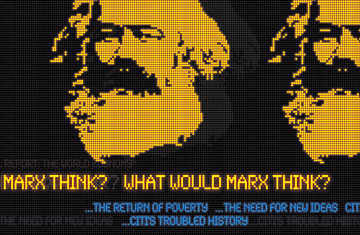
(2 of 4)
There's a lot about today's mess that Marx couldn't have predicted, of course, from credit-default swaps and subprime mortgages to global economic imbalances. The capitalism of today, for all its failings, is far removed from the cruder version that Marx analyzed, before the advent of pension and unemployment systems, medical insurance and health and safety legislation. Still, as the Archbishop writes to the bearded one in his own version of Das Kapital: "There's a question that won't leave me in peace: At the end of the 20th century, when the capitalist West defeated the communist East in the battle between systems, were we too quick to dismiss you and your economic theories?"
Pulling on the Same Rope
Karl Marx was born in trier, in a
whitewashed three-story house with a courtyard in Brückenstrasse. More than one-third of the 40,000 annual visitors to the house come from China, some as individual tourists but many in groups, such as the delegation of students from a Communist Party academy in Beijing who dropped by recently. Vietnam is the only other nation that still sends official delegations. That's a big change from when the Berlin Wall was still standing and the house was an obligatory stop on the Communist world tour. The director today, Beatrix Bouvier, has a mandate to update the place for the post-Cold War era. She has opted for sobriety. The rooms give factual details about Marx's life, his influences, his friendships, his writings — and his legacy. A top-floor room shows photos of Stalin and the Soviet gulag, the crushing of uprisings in Hungary and Czechoslovakia, the collapse of communism in Eastern Europe and the protests at China's Tiananmen Square in 1989. "A lot of things were done in his name in the 20th century, and we have to live with the consequences," Bouvier says. "Marx is so contested and contradictory. We show him as being many-sided." It's a view that upsets true believers, who sometimes send letters accusing her of being "counterrevolutionary."
Which, in a way, is fair enough. There's nothing revolutionary about Trier itself, a tidy place that takes pride in its Roman heritage. It has quietly prospered in a way that has nothing to do with Marx. Indeed, Trier is a fine example of the traditional postwar German model of capitalism, what the Germans call their "social market economy." Most of the 35,000 firms in the area are tiny, with fewer than 20 employees, but they have thrived on the old-fashioned values of hard work and family ownership. There is close to full employment. The local savings banks know their customers well, didn't dabble in arcane derivatives they didn't understand, and have escaped the financial turmoil of the past few months virtually unscathed. Arne Rössel, director of the local chamber of commerce, says people are nervous about the economy, but firms "are coming from a very comfortable position with good liquidity."
Trier is not immune to the crisis. Several local firms supply the auto industry and have been hurt by its woes. One of the biggest employers makes construction machinery; its orders are down 90%. But at times like this, old-fashioned German capitalism shows its strengths: so far there have been almost no layoffs. About 100 local companies have scaled back their operations or stopped work altogether, but under German labor laws, furloughed workers can continue to receive 80% of their salary for several months even if they're not working. Firms pay a part of the social-security contributions, and the government unemployment agency picks up the rest.